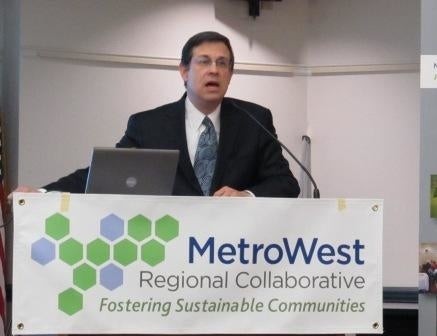Marc Draisen, executive director of the Metropolitan Area Planning Council, the Boston-based regional planning agency, did not sugarcoat the issue of transportation during a forum last week in Natick.
“The commonwealth’s transportation system is in crisis,” he told a group of about 50 residents, state legislators and concerned citizens who attended a public forum co-hosted by MAPC.
MAPC, along with the Massachusetts Public Interest Research Group (MassPIRG), held the event to discuss the most pressing transportation needs in the state and brainstorm ideas of how to solve them, with an emphasis on sustainable transportation solutions.
But what does sustainable mean?
It’s a comprehensive approach that incorporates public transportation, bicycling and pedestrian traffic, plus smart-growth development near existing infrastructure. According to Eric Bourassa, MAPC transportation director, the future of transportation across the country cannot just focus on adding more lanes to our highways.
Most people in the audience agreed. The biggest problem: How to pay for it.
Traffic Jams
There has been increasing evidence of the negative consequences stemming from the over-dependence of the automobile as the dominant form of transportation in the United States, according to Bourassa.
With so many people on the roads, traffic jams are plentiful and the cost of living is higher. There is also a big impact on the environment with all those fossil-burning fuel cars on the highways.
Bourassa noted that an estimated 73 percent of Massachusetts commuters drive to work alone. He also said that in 1969, half of children walked to school versus just 13 percent now.
To further complicate matters, there has been a steady underinvestment in transportation in recent decades. The state’s commuter rail system, for example, has had little in terms of major upgrades in recent years, causing delays due to sluggish operation. Recently, a train ride from Boston to Worcester took four hours.
State Sen. Karen Spilka, D-Ashland, who attended the forum and is chair of the state Legislature’s economic development committee, said the issue is also about jobs and creating incentives for companies to locate in MetroWest.
“If [companies] can’t get their employees to the job site, they’re not going to that location,” she said.
Ed Carr, executive director of the MetroWest Regional Transit Authority, said one key is increasing the use of public transportation.
Carr estimated that the MWRTA, which runs more than a dozen bus routes across the MetroWest region, is at about 20 percent of its capacity. He cited the limited Saturday schedule and no Sunday routes, plus limited daytime hours of the service.
“We do have some growing to do,” he said.
One goal, Carr said, is to increase interoperability between the MWRTA, the Worcester Regional Transit Authority and the Massachusetts Bay Transit Authority, which runs the commuter rail and subway systems.
Already 35 percent of riders use the MBTA’s Charlie Card on the MWRTA, which he said is a service that took two years to organize and launched late last year.
Other residents at the forum had their own ideas.
Kurt Marden, an Acton resident, said greater connectivity between the various commuter rail lines in the state is needed. He showed an illustrated plan of what he called an “outer loop” commuter rail track that would run roughly parallel to the Interstate-495 highway corridor.
Peter Hill of Weston said he’d like to see more public-private partnerships in transportation planning. Trains stations, subway stations and bus stations at or near places of major employment are a great way to get commuters to use public transportation, he said. He even proposed installing a gondola, or an aerial transportation device commonly used at ski areas, to connect businesses to nearby train stations and T stops.
John Stasik, a former Framingham state representative, said that while most of the ideas offered at the meeting were good ones, the reality is that funding for such projects is difficult to obtain.
To have a truly efficient transportation system, one that includes high-speed rail, ubiquitous public transportation and safe bicycle and pedestrian ways, would not cost millions of dollars, but billions.
Legislative Track
The Natick meeting is part of a series of roundtables hosted by MassPIRG and Transportation for Massachusetts, the local affiliate of the nationwide Transportation for America, which advocates for transportation funding. MassPIRG has also held roundtables in Fitchburg and Amherst and the organization plans to hold others across the state in the coming year.
MassPIRG has also teamed with state Rep. Carl Sciortino, D-Medford, who has filed a bill in that aims to increase public transportation ridership while developing new funding formulas for allocating state transportation dollars. Another portion of the bill installs “fix-it-first priorities” that calls for repairing existing infrastructure before committing to major new projects.
That bill is slated to be considered by state lawmakers this year.

